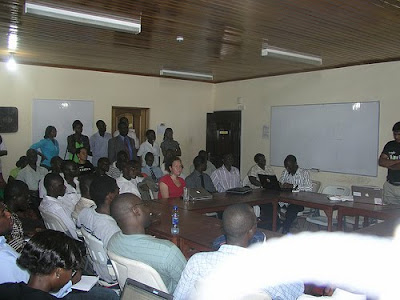> Seriously, Ghanaians!?
Noone is throwing a New Year’s Eve party? Not even a small one?
”Traditionally” (would be interesting to know when and where this practice comes from), New Year’s Eve in Ghana is a day for contemplation, gratitude and prayer – clearly a Christian holiday! Most people dress in white (celebratory clothing) and head for the churches around 8-9 pm. The final hours of the year is spent praying, listening to sermons and singing hymns. Many times, the sermons are held outside the church room, as the crowds cannot fit inside the chapels and churches. The transition to the new year has nothing like the festive ”10-9-8-7…”, rather it is a very serene and gradual change with nothing special to mark midnight. However, around 1 pm, many people start heading home. (And from what I hear, some of these churchgoers then changes into other clothes and head out for a drink, but this is a different story).
So, what is the problem? Well, it is strictly personal, I suppose: I just miss the European way of celebrating New Year’s Eve. I miss having to choose between parties. I miss the anticipation for the New Year. I miss planning ahead for a most luxurious evening with shiny and glittering outfits, chilled champagne and beyond good foods. I miss the obligatory chant of ”10-9-8-7-6-5-4-3-2-1-HAPPY-NEW-YEAR!” I miss kissing friends and family in a delirious state and then topping it off with more bubbly and dancing!
However here in Ghana, it seems no parties are planned for tomorrow night and I am still the only one considering Christmas the main Christian holiday in December.
Pic: Party outside of Ghana.


![Reblog this post [with Zemanta]](https://img.zemanta.com/reblog_e.png?x-id=80328981-150b-4871-b455-cf4a87368c9f)

![Reblog this post [with Zemanta]](https://img.zemanta.com/reblog_e.png?x-id=2c6a5e9c-070b-4aa8-a71b-625c205997c6)

![Reblog this post [with Zemanta]](https://img.zemanta.com/reblog_e.png?x-id=823f9b1c-5ea5-49e7-bc9d-098ef75ec8f1)

![Reblog this post [with Zemanta]](https://img.zemanta.com/reblog_e.png?x-id=d8016102-24b3-4dc8-8295-a8589ee2ca31)

![Reblog this post [with Zemanta]](https://img.zemanta.com/reblog_e.png?x-id=a64b3a6f-b80d-414a-86c5-bfd47ae014fa)
